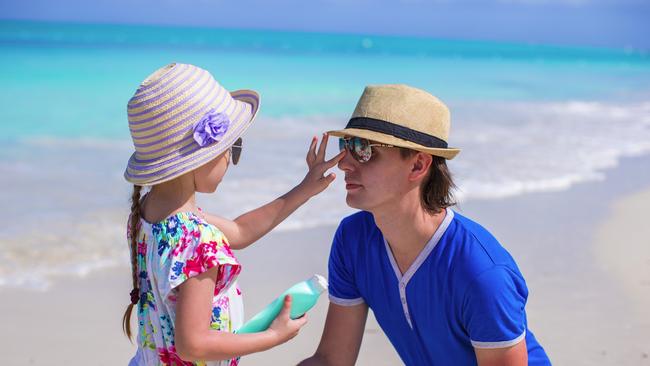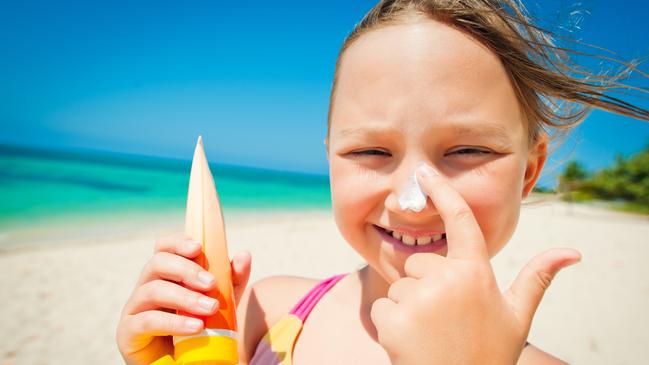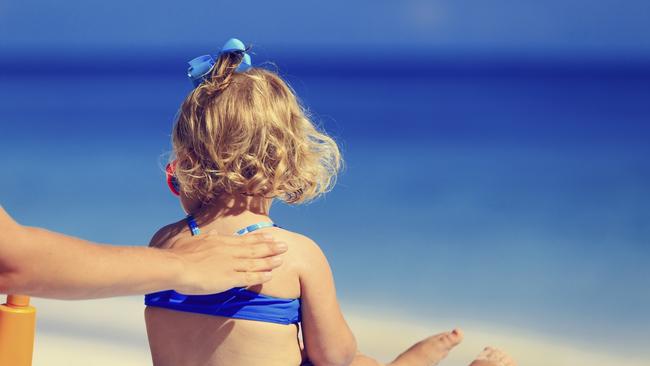Sunscreens sold in Australia to be tested for cancer-causing chemicals for the first time
Sunscreens sold in Australia will be tested for cancer-causing chemicals for the first time following the shock results of US studies.
Health
Don't miss out on the headlines from Health. Followed categories will be added to My News.
Sunscreens sold in Australia will be tested for cancer-causing chemicals for the first time ever after US studies found they contained two carcinogenic substances and one brand was removed from the market.
The Therapeutic Goods Administration has told News Corp it is investigating whether products sold in Australia contain known carcinogens benzene and benzophenone.
“The TGA is currently investigating this issue and is conducting testing of samples of sunscreen products containing benzene as well as products containing octocrylene for the presence of benzophenone and compliance with existing standards,” the medical regulator said.
“The results of this testing will be published on the TGA website when available,” it said.
Sunscreens are only meant to contain low-risk ingredients but earlier this month pharmaceutical company Johnson and Johnson withdrew one of its Neutrogena sunscreens sprays after it was found to contain the cancer-causing chemical benzene.
The TGA said it regularly tests the quality and efficacy of sunscreens “however we have not regularly tested for carcinogens”.
In June Valisure, a US company that tests generic medicines for purity found nearly 80 sunscreens including popular brands similar to those sold in Australia were contaminated with benzene.

This week another US laboratory found other sunscreens that contained the permitted ingredient Octocrylene had another carcinogen – benzophenone.
The study found over time Octocrylene degraded producing benzophenone.
Adelaide University toxicology expert Professor Ian Musgrave said unlike benzene which is a class one carcinogen, benzophenone was a class two carcinogen.
There was some evidence it caused cancer in animals but none so far that it caused cancer in humans, he said.
“It’s not like any concentration at all will produce that effect, you have to get to a certain concentration before you have this threshold, and the amount of benzophenone that is present in the sunscreens is nowhere near that threshold,” he said.
“It’s ludicrously lower so you don’t really need to be worried about this,” he said.
The TGA said Octocrylene is an approved active ingredient in sunscreen products marketed in Australia and overseas at a maximum concentration of 10 per cent.
“Based on currently available data, the TGA does not consider that octocrylene as an ingredient in sunscreens up to the currently-permitted concentration presents an unacceptable safety risk when the sunscreens are used as directed,” the regulator said.
The TGA is actively monitoring the available data about the carcinogenic potential of benzophenone, it said.
“There is currently insufficient information to conclude that sunscreens that are compliant with existing requirements for product stability and impurities such as benzophenone are unsafe,” the TGA said.
Australia has the highest rate of skin cancer in the world and the TGA said it was important that Australians used sun protection.
“There is clear and overwhelming evidence of the benefits of sunscreen in the prevention of sunburn and skin cancers,” it said.
.
NEW CANCER CAUSING CHEMICAL FOUND IN SUNSCREEN
Weeks after a popular sunscreen was withdrawn from sale in Australia for containing the cancer causing chemical benzene, another cancerous chemical has been found in sunscreens.
US chemical testing laboratory Haereticus Environmental Laboratory (HEL) have written to the US medicines regulator the FDA asking it to pull all sunscreens that contain the active ingredient octocrylene.
The laboratory claims an anti-ageing cream ingredient, Octocrylene, contained in sunscreen degrades into a toxic chemical — benzophenone — a known carcinogen.
It can also interfere with hormones and “it may act as a reproductive toxicant”, the researchers said.
The presence of benzophenone in food products or food packaging is banned in the United States.
However, Octocrylene is approved for use in sunscreens, moisturisers, lip balms, and anti-ageing products in the US.
In the United States nearly 3000 products contain Octocrylene.
Brands tested in the scientific research and found to contain the chemical included Coppertone, Banana Boat, Neutrogena, Garnier, LaRoche and L’Oreal.
The concerns have arisen because a new study shows “Octocrylene naturally degrades into the chemical, benzophenone, in over a dozen popular products,” the Haereticus Environmental Laboratory said.

The study published in the journal, Chemical Research in Toxicology was conducted by French and American researchers at Sorbonne University.
Scientist Joseph DiNardo, a toxicologist who formerly worked in the cosmetics industry and Haereticus Environmental Laboratory’s Dr Craig Downs were also involved in the research which tested 16 octocrylene-based sunscreens purchased in France and the U.S.
“Benzophenone concentration in the products quickly increase as the product ages,” the laboratory said in a statement on its website.
Both octocrylene and benzophenone are readily absorbed into the skin, the group said.
Early this month Pharmaceutical company Johnson & Johnson Pacific Pty Ltd recalled all batches of Neutrogena Ultra Sheer Body Mist Sunscreen Spray SPF 50+ (aerosol sunscreen), because benzene was been detected in some batches supplied in Australia.
The withdrawal came after News Corp revealed another study by Valisure, a US company that chemically tests generic medicines to check whether they contain contaminants found 78 sunscreen brands contained the chemical including Neutrogena and Banana Boat.
In June Australia’s medical regulator the Therapeutic Goods Administration (TGA) said benzene was not included in the list of pre-approved, low-risk ingredients permitted for use in listed medicines, which include sunscreens.
However, it said its regular safety reviews had not tested sunscreen products for the chemical.
Weeks later on August 2 the regulator announced “benzene has been detected in some batches supplied in Australia”.

Pharmaceutical company Johnson & Johnson Pacific Pty Ltd recalled all batches of Neutrogena Ultra Sheer Body Mist Sunscreen Spray SPF 50+ (aerosol sunscreen), because benzene was detected in some batches supplied in Australia.
“All batches with an expiry date of 30th August 2023 or earlier should not be used due to possible health risks linked to benzene,” the nation’s medicines watchdog the Therapeutic Goods Administration (TGA) said in a statement on its website.
“Johnson & Johnson Consumer Inc product testing detected benzene at concentrations less than 3 ppm in 2 of the 17 batches supplied in Australia,” the regulator said.
“Exposure to benzene in this sunscreen product, at the levels detected, would not be expected to cause serious adverse health effects, but to reduce the risk to consumers, Johnson & Johnson Pacific Pty Ltd is recalling all batches of the affected product supplied within Australia,” the TGA said in a statement.
Adelaide University toxicology expert Professor Ian Musgrave said the cancer scare associated with the sunscreen was being overblown.
“Yes, Octocrylene is broken down into benzophenone BUT … the IARC lists it as a 2B carcinogen, which means it is a possible carcinogen, like aloe vera,” he said.
There is no relevant data from humans but in mice skin application of benzophenone found no cancer induction on skin.
“Benzophenone isn’t on that EU list of banned ingredients and cosmetics, and the levels in
sunscreen (after the equivalent of a year in storage), is about 1/3 of the amount you are allowed to eat safely (according to the European Food Safety Authority). And only about 44 per cent of the applied amount gets from the skin into the body anyway” he said.
Cancer Council spokesman on skin cancer at Adjunct Associate Professor Craig Sinclair said Sunscreens sold in Australia are strictly regulated by the Therapeutic Goods Administration (TGA), who determine which ingredients are safe and at what limits.
This includes octocrylene.
“Sunscreens sold in Australia are required to meet some of the most stringent criteria in the world to ensure they are safe and effective, this also requires strict manufacturing standards,” he said.
While there is no evidence to suggest that sunscreens approved by the TGA for use in Australia cause cancer, there is strong evidence that sunscreen prevents skin cancer., he said.
“We know that each year around 2,000 Australians die of skin cancer, which is why it’s important for Australians to continue to use all five forms of sun protection when UV levels are 3 or above – slip on a shirt, slop on sunscreen, slap on a hat, seek shade and slide on sunglasses,” he said
Originally published as Sunscreens sold in Australia to be tested for cancer-causing chemicals for the first time





